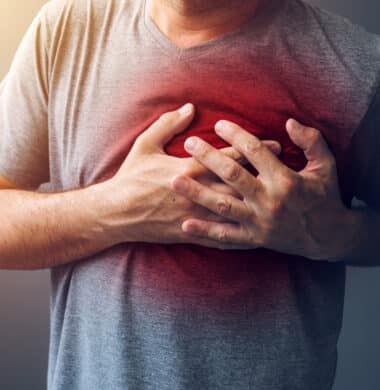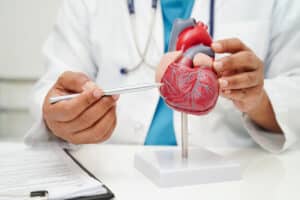Common Heart Attack Symptoms

A heart attack (or myocardial infarction) can be deadly, but quick action can minimize damage and even save your life. It’s important to understand heart attack symptoms so you know when to seek emergency care. After reading this list, also check out some deceptive heart attack symptoms, too.
To be clear: if you suspect a heart attack, it’s best to get emergency care even if you aren’t sure you are having a heart attack. You should only avoid seeking care if you are confident that you’re not having a heart attack.
Chest Pain
Chest pain is the number one heart attack symptom. Typically, heart attack pain is in the center of your chest. People describe it using different subjective terms as:
- Discomfort
- Squeezing
- Heaviness
- Crushing
- Fullness
The pain can be moderate or severe, and it typically lasts for several minutes or goes away and then returns.
Shortness of Breath
Shortness of breath is a feeling that you can’t breathe or that you aren’t getting enough air when you breathe. Shortness of breath can have many potential causes that aren’t related to a heart attack, which might include unusual exercise or tight clothing. People often report shortness of breath when at a higher altitude than they’re used to (like someone visiting Colorado from the coast or someone from Denver climbing a 14er).
If you can’t think of any common reason why you have shortness of breath, and it’s accompanied by chest pain, it’s probably time to get professional care.
Lightheadedness, Nausea, or Vomiting
If you’re not getting enough oxygen, or if that oxygen isn’t reaching your brain, it can make you feel lightheaded. You might feel dizzy, have difficulty thinking, or need to sit down before you fall.
Nausea and vomiting might seem like strange symptoms for heart attack, and the truth is, we’re not sure exactly why heart attack causes these symptoms. What we do know is that they can be a strong predictor of heart attack. In one study, people admitted to a cardiac unit were three times more likely to be having a heart attack if their symptoms included nausea and vomiting.
Severe Fatigue

When your heart can’t pump oxygen- and nutrient-carrying blood to your body, the starved organs can feel tired, which can result in an overall sensation of fatigue.
Jaw, Neck, or Back Pain
Jaw pain might seem like another unusual symptom for a heart attack. Typically, this pain comes after the initial pain in the chest, and it radiates outward. The prevailing theory is that a heart attack triggers the release of substances that can stimulate nerve endings, leading to pain.
Although this type of pain typically comes after heart attack chest pain, in a small number of cases, pain in the jaw, head, and teeth is the only reported symptom of heart attack.
Arm or Shoulder Pain
Arm or shoulder pain happens due to a similar mechanism as jaw, neck, or back pain. Typically, it’s the left arm that’s affected.
Women are more likely than men to experience arm or shoulder pain related to their heart attack.
How to Distinguish Heart Attack from Benign Conditions
Obviously, not all of these heart attack symptoms automatically imply that you are having a heart attack. However, the more of these symptoms that you experience, the more likely it is that you are having a heart attack. If you have all six symptoms listed above, you should immediately seek help.
Heartburn is another common cause of chest pain that people confuse with heart attack. In heartburn, pain is more likely to be lower – closer to the abdomen – but it can extend all the way up the throat. Heartburn might also cause an acidic taste or stomach contents to rise to the mouth.
Chest muscle spasms can also cause chest pain that people think is a heart attack. This can also cause radiating pain to the head, neck, shoulder, and arm. However, spasms don’t usually cause other symptoms like shortness of breath, lightheadedness, or fatigue.
When in Doubt, Get Care

South Denver Cardiology Associates Can Help
If you’re concerned about your heart attack risk or if you’re recovering from a heart attack, let South Denver Cardiology help. We are dedicated to providing our patients with comprehensive programs to improve cardiovascular health. We offer heart attack prevention, including helping you detect and manage coronary disease. An accurate calcium score can help you understand your heart attack risk so you know how aggressive your prevention should be. We also help patients with heart attack recovery so you can keep enjoying life after your heart attack.
We engage personally with each patient and provide you with solutions tailored to your specific needs. Whether this means medication, surgery, or just a change in diet and activity levels depends on what’s best for you. We are also always looking for new technologies and techniques that give better results and a better experience.
To learn how South Denver Cardiology can help you before or after your heart attack, please call us or use our online form to request an appointment. We serve patients in Denver, Littleton and the surrounding areas.
- 9 Tips to Reduce Holiday Stress - December 11, 2025
- 6 Tips for Exercising Outdoors with a Heart Condition - May 19, 2025
- Lifestyle Changes That Can Help Manage Arrhythmia - April 30, 2025
Sign Up
As with any health concerns, your specific treatment program should be discussed thoroughly with your primary care physician as well as any specialists who may need to be consulted – like a cardiologist.
Sign Up
